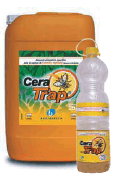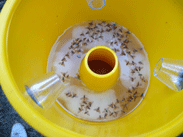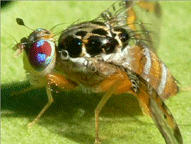New Product: CeraTrap®
 CeraTrap® is a liquid food-based trap that is sold in two types of traps: trap and bottle-trap. The new format of the bottle-trap is sold filled and ready to use. It does not need to be filled as with the traditional trap systems
CeraTrap® is a liquid food-based trap that is sold in two types of traps: trap and bottle-trap. The new format of the bottle-trap is sold filled and ready to use. It does not need to be filled as with the traditional trap systems
CeraTrap®is an attractive liquid food presented in two different formats: fly trap and bottle. The new bottle trap option is already charged and ready to use, avoiding the need to fill the traditional fly trap.
CeraTrap® is an efficient and ecological solution against the fruit fly.
The ready to use CeraTrap® Bottle utility model patented in Spain has additional advantages as regards easy of handling and duration thanks to the unique loading system and to its flange top for direct use in the field.
 The CeraTrap® has been presented at several prestigious symposia and congresses. Considerable product development work has moreover been carried out in the field, performing field tests for optimization and comparative tests with the standard systems on the market.
The CeraTrap® has been presented at several prestigious symposia and congresses. Considerable product development work has moreover been carried out in the field, performing field tests for optimization and comparative tests with the standard systems on the market.
This campaign is celebrating its third anniversary with well-proven results.
How it Works
CeraTrap® causes the continuous, controlled, emission of volatile compounds, mainly amines and organic acids, with a high power of attraction for the adults of this plague, mainly for the females. When the flies enter the trap they die on drowning in the liquid.
Method of use and density of traps
With stone fruit tree crops and vineyards it is convenient to install them in the field approximately 45 days before the commercial maturity of the fruit or grape. The fly traps are installed with a density of between 70 and 120 units per hectare, depending on the CeraTrap® system used (CeraTrap® Bottle and CeraTrap® fly trap). They are placed regularly depending on the plantation layout and, if considered necessary, based on the knowledge of each estate in particular certain borders can be reinforced if it is known that they are the entry points for the flies. The density of installation depends on the:

- System Used
- Size of the estate (the larger the surface area the less the no. of fly traps)
- Sensitivity of the crop (species and variety.)
Advantages
- 100% environment-friendly solution; does not contain insecticide in its formulation, and does not need insecticide tablet (vapona) to work effectively
- Does not leave residue on the fruit; absence of withholding period
- Great selectiveness; specific product to catch the fruit fly, respectful of useful fauna
?Excellent value for money; the CeraTrap® system has a cost comparable with the intensive treatments which use chemical products
Background
 The Mediterranean fruit fly, Ceratitis capitata, is one of the most damaging agricultural plagues worldwide. This plague is native to Sub-Saharan Africa and has a long history of invasion. At present, in the Mediterranean region, the fruit fly is one of the most difficult plagues to control. It is extremely avid for sources of protein, has a high number of descendants in each generation and attacks during harvest time.
The Mediterranean fruit fly, Ceratitis capitata, is one of the most damaging agricultural plagues worldwide. This plague is native to Sub-Saharan Africa and has a long history of invasion. At present, in the Mediterranean region, the fruit fly is one of the most difficult plagues to control. It is extremely avid for sources of protein, has a high number of descendants in each generation and attacks during harvest time.
The damage to the fruit is produced by the sting of the female, a yellow stain forming around it on oranges and mandarins, and chestnut-coloured on peaches. When the larva feeds on the flesh this favours the oxidation and premature ripening processes of the fruit, making the fruit rot and making it unsellable on the market. If stung fruit is packed, with larvae in the initial phase of development, they evolve during transport.
The main damage tends to occur to the earliest varieties of mandarins and oranges.
Several control techniques have been developed such as mass trapping, the release of sterile males or repellent products to be able to control this plague with the minimum pesticide residue. The main problem is the need for insecticide and handling.
The trend is to introduce control systems which ensure a quality of the products to be marketed with minimum damage to the plot and without pesticide residues on the fruit.